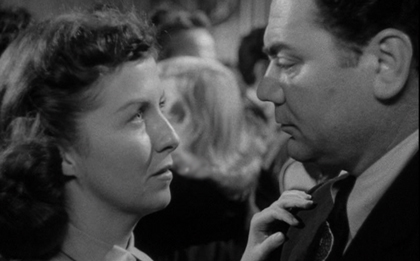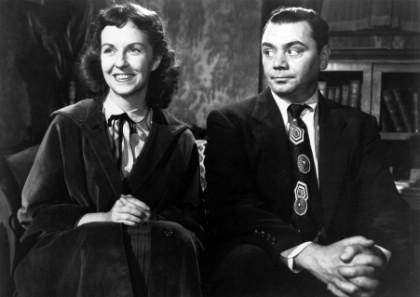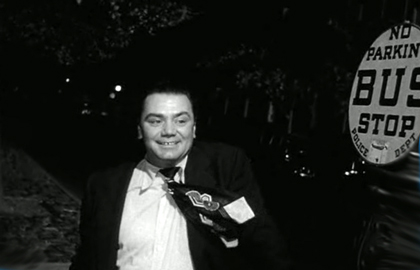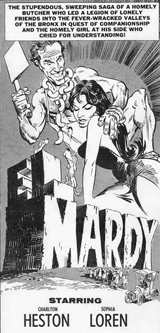|
|
Reviewed by Glenn Erickson
Every few years the term 'independent cinema' is redefined to fit some producer's plan to bypass the studio system on the way to theater screens. In 1955 a small sleeper hit attracted attention as an alternative to the standard Hollywood way of doing business. It didn't matter that the film was made by Hollywood insiders. Audiences fell in love with Marty and identified with its glamour-challenged leading characters. Although not a monster hit, it did very well and was reviewed even better. The New York Times' Bosley Crowther was so impressed by the film's common touch that he capsulized its entire plotline in his review. Marty generated such goodwill that it was nominated for eight Oscars and won four. It took most of the major American critics' prizes as well as several overseas, including the Cannes' Palm d'Or.
Marty made news for other reasons as well. The first live TV production to be adapted to the big screen, it demonstrated that Hollywood and network TV didn't have to be enemies. A major studio would never have made such a deal, but by 1954 a number of big stars had formed their own production companies. Partners Harold Hecht and Burt Lancaster had a good thing going with United Artists, having made the hit pictures Apache and Vera Cruz; for this project Burt Lancaster mostly contributed an appearance in the film's trailer, perhaps compensating for the lack of star names in the film itself.

Rod Steiger and Nancy Marchand had starred in the noted TV drama. They were almost the only talent replaced for the film version. Playwright Paddy Chayefsky adapted his own TV script and TV director Delbert Mann made the jump to feature directing. Esther Minciotti, Augusta Ciolli and Joe Mantell made the jump as well. Five years earlier, character actor Ernest Borgnine was playing an endless series of thugs, hoodlums and western bad guys. Despite gaining major attention as the villainous Sgt. Fatso in From Here to Eternity, Borgnine returned to playing stock baddies like Black Bart in Johnny Guitar. The role of Marty Piletti came out of the blue for Borgnine. He was selected not for his box office stature but because he was simply perfect casting. Marty describes himself as heavy-set and stocky, and when unhappy calls himself 'a short, ugly man.' In old Hollywood it was a rare thing for a character actor, a 'type', to cross the line to leading player. Butlers played butlers and western bad guys didn't graduate to wearing white hats. Seeing Ernest Borgnine suddenly playing a lonely, sensitive guy had that much more impact, as it was like discovering that a frightening neighbor revealed as sweet and lovable. Actor Borgnine became a bigger, always sympathetic star. 1
Co-star Betsy Blair's engagement to play Clara Snyder was another story altogether. A liberal activist, Blair had tried to join the Communist Party but was turned down. She was also married to Gene Kelly, a prominent liberal whose stardom and value to MGM shielded him from blacklisting attacks. Denounced in Red Channels, Blair was allowed to play in a small John Sturges movie called Kind Lady, but then found herself blacklisted. She only won the role of Clara through powerful connections. 2
Paddy Chayefsky's original inspiration for Marty was a sign he saw in a New York ballroom: "Girls, Dance With the Man Who Asks You. Remember, Men Have Feelings, Too." The movie version of his TV play opens the film up onto the streets of New York City. Bronx butcher Marty Piletti (Borgnine) is 34 and loveless, and sick of being lectured by his relatives and customers, to "find a nice girl." He's ready to accept that he'll always be a lonely bachelor, hanging out with his friends. At a dance hall where no woman will dance with him, Marty is about to give up when he sees a plain girl ditched by her blind date. She walks out to a balcony to cry and Marty follows. She's Clara Snyder, a Brooklyn schoolteacher who also considers herself a hopeless wallflower. Awkwardly at first -- he even refers to himself and Clara as 'dogs' -- Marty talks and dances with Clara, and they find that they are kindred souls. Do they have a chance? With his low self-esteem, Marty could easily give up on the whole idea.

Marty and Clara grab our hearts from the first. Their problems are the garden-variety kind that most everyone has come in contact with. Clara's parents don't really understand her, and seem to have accepted the fact that she'll be a spinster. Marty feels unwelcome influences from all directions. His married younger brother (future TV director Jerry Paris) disrepectfully ignores his requests for business help. Marty's loving mother (Esther Minciotti) wants Marty to find a girl, but becomes frightened when Aunt Catherine (August Ciolli) tells her that if Marty marries, she'll lose her house and be all alone. Worst of all are Marty's unmarried friends, who spend the weekends figuring out how to meet girls willing to have sex with them. They idolize Mickey Spillane's attitude toward women and advise Marty that 'going out with dogs' is bad for his reputation. The worst influence is Marty's best friend Angie, a needy whiner and bully. Emotionally too attached to Marty, Angie seems to need Marty to be a loser, to bolster his own self-esteem.
Everyone compliments Paddy Chayefsky's Marty for its natural storytelling and marvelous dialogue. The characters are beautifully delineated with Marty Piletti making the impression of 'someone we know', someone we like and trust. He seems authentic, washing his hands as soon as he enters the house, as a butcher might. Marty hasn't an unkind thought for anyone. He gets along famously with his mother and laughs when she suggests he go out dancing to a ballroom where he can meet, "tomatoes". Marty only looks miserable at the "happy" dance hall. We can feel his pain when a girl gives him a quick look before refusing to dance with him. And he's shocked when a caddish guy offers him five dollars to 'take over' the dog date he's been stuck with.
Hopefully things have changed somewhat, but there was once no horror worse than being a wallflower and not understanding why. Being rejected or ignored makes one feel like a complete failure. Chayefsky addresses the problem directly -- social popularity is a state of being so essential that those that qualify treat those that don't as if they were diseased. Clara Snyder long ago gave up attending dances on her own but this night she had a date, and with him high hopes. When Marty and Clara meet, it's a miracle reprieve from loneliness but also a victory for the romantic notion that there's someone out there for everyone. In 1955 Marty seemed a challenge to the Hollywood lie that audiences could only identify romantically with glamorous stars. By that logic the real world belongs to 20,000 beautiful celebrities, and the rest of us are insignificant rejects.

Marty captures the atmosphere of a bunch of unspecial, horny bachelors sitting around looking at mild porn and strategizing how to take advantage of women. Only the sleazy Ralph (Frank Sutton of Gomer Pyle, U.S.M.C.) seems to have a good thing going, as he's found some cooperative nurses. The play is famous for the dialog lines in which these aimless, unfulfilled drones ask "Whatta you wanna do tonight?", only to hear back, "I dunno, whatta you wanna do tonight?" Almost as quotable is, "Boy that Mickey Spillane can really write", a deathless assertion that expresses the grim lack of enlightenment in the room. I hope that Chayefsky and Delbert Mann's film of The Bachelor Party (1957) receives some attention as well, as it's almost as good.
Andrew Sarris called director Delbert Mann 'dreary' because he doesn't qualify as an auteur. Mann is inconsistent yet did very good work interpreting the plays Middle of the Night (probably Kim Novak's best acting performance) and Separate Tables (warped out of shape by star Burt Lancaster but still good). If Delbert Mann in any way helped improve Blair and Borgnine's performances, he wins a pass. The only weak link in Marty are the scenes between Marty's brother Tommy (Jerry Paris) and his wife Virginia (Karen Steele). Their characters are just less interesting than anyone else. The most original character conception may be the lowlife Angie, who is quickly turning into a miserable malcontent. Actor Joe Mantell rarely got good film parts, but he did score almost as big in Roman Polanski's Chinatown. There he gets the best dialogue line of the 1970s: "Forget it Jake...."

The KL Studio Classics Blu-ray of Marty is sourced from a flat open-matte transfer of this 1955 United Artists release that was originally presented theatrically at 1:85. The transfer is not particularly recent. Although clearly in HD it is somewhat dirtier than we'd expect and perhaps not as sharp. It is of course far better than the prints that once showed constantly on television.
Disc companies licensing films from studios usually must accept the transfers they are given. I understand that Kino checked out the idea of re-formatting this flat transfer for widescreen, but decided that doing so cropped the image too severely. It's possible that the flat transfer was a bit tight to begin with. Looking at the film with this in mind we can see that the intended 1:66 or 1:85 scan was meant to be a little north of center. Most of the image trimmed away would come from the bottom. This means that a few shots would indeed drop information we're accustomed to seeing. I personally think the film would look nicer with a crop, but it looks just fine flat as well. And I'm glad that this  particular transfer wasn't enlarged in the editing bay -- even though I won't pretend that I can detect when that particular trick is pulled.
particular transfer wasn't enlarged in the editing bay -- even though I won't pretend that I can detect when that particular trick is pulled.
The KLSC disc includes a scene in which Betsy Blair's Clara returns home and wakes up her parents to tell them her evening with Marty. When I started "MGM VIDEO SAVANT" for the studio in 1997, one of the first consumer letters I fielded wanted to know why this scene had been deleted from the MGM Vintage Classics VHS (and later DVD). I found out that John Kirk and others in MGM's restoration department were aware of two versions of Marty and were looking for the longer one. It was eventually found, but I never heard an explanation why the movie had been cut. Don't be confused -- although the packaging cites the Blu-ray as being at 90 minutes, what's on the disc is the full version, just under 94 minutes in length.
Burt Lancaster does indeed host the original trailer, KLSC's only extra. The trailer is textless, which explains why several neutral scenes are held on screen; they're supposed to have the actors' names, the title, and perhaps other text superimposed. Two of the actors' names are present because the shots were taken right from the film's concluding cast wind-up.
I couldn't resist... the final image is lifted from an old Mad magazine, in a satire about Hollywood's knack for turning any story into an epic road show attraction, no matter how inappropriate. The text at the top reads: "The stupendous, sweeping saga of a homely butcher who led a legion of lonely friends into the fever-wracked valleys of the Bronx in quest of companionship and the homely girl at his side who cried for understanding!"
On a scale of Excellent, Good, Fair, and Poor,
Marty Blu-ray rates:
Movie: Excellent
Video: Very Good
Sound: Excellent
Supplements:
Deaf and Hearing Impaired Friendly?
YES; Subtitles: English
Packaging: Keep case
Reviewed: July 29, 2014
Footnotes:
1. Make that a bigger-than-life lovable star. While guest-ushering at a Director's Guild screeening of Lady Sings the Blues in 1972, I saw Borgnine glad-handing friends and industry colleagues as he walked his wife up the aisle. His face and grin looked HUGE, like the Friendly Lion in a storybook. I instantly liked him, from fifty feet away.
Return
2. Producer Harold Hecht had been a friendly witness, and when Blair's auditions with Ernest Borgnine went well both Chayefsky and director Mann wanted her for the part. Known as an unrepentant Red, Blair's efforts to appease various unseen powers did nothing until her husband Gene Kelly interceded. He went to Dore Schary and threatened to quit It's Always Fair Weather unless Schary did something. Dore got Blair a "one-film" exemption from The American Legion, but the blacklisters saw to it that Blair's powerful, attention-getting role in Marty was a dead end. (from Ms. Blair's career interview in the book Tender Comrades by Patrick McGilligan and Paul Buhle.)
Return

Text © Copyright 2014 Glenn Erickson
See more exclusive reviews on the Savant Main Page.
Reviews on the Savant main site have additional credits information and are often updated and annotated with reader input and graphics.
T'was Ever Thus.
Return to Top of Page
|

